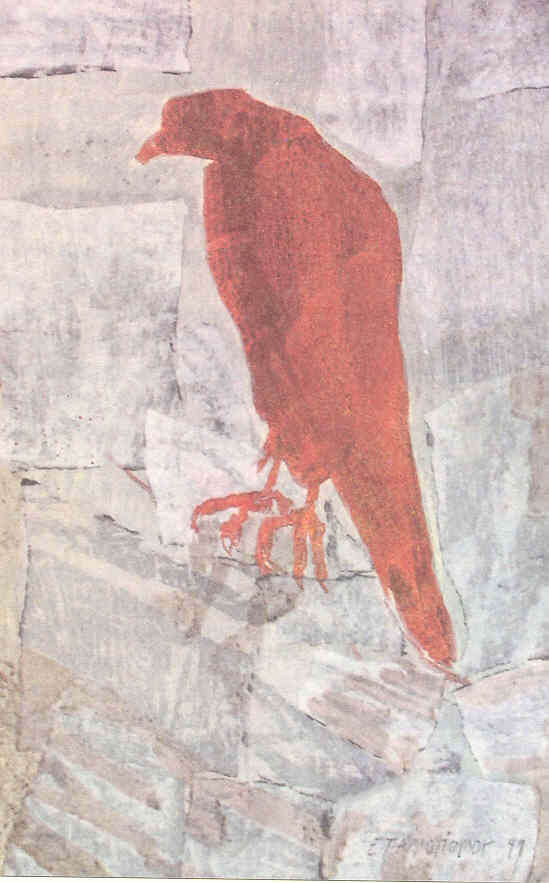


|
Feelings such as liking and dislike are often unpredictable and depend on minor details that are hard to pin down. Reason is not in a position readily to explain how it is that at one glance we can decide whether or not a person is compatible with ourselves. What are those criteria that are set in motion instantaneously and pass comprehensive judgement on another human being in a matter of seconds? Whatever they are, they are capable of leading us into strange, contradictory behaviour, particularly if we are obliged to live together with the object of our antipathy. What connection does all this have with a honey buzzard? Let us first say a thing or two about them. Honey buzzards, also called wasp buzzards or just waspers, are birds of prey, but of all the birds of prey they are those which seem least like what they are. This is true both of their character and of certain visual features. Their face does not have the fierce expression of others such as eagles and common buzzards. They look rather like a pigeon. Their beak is not all that pointed, nor is it so very hard. Their nails squeeze your hand without tearing the skin. They idle away the hours, when they are in the surgery for treatment, intoning in chorus a mysterious and for us incomprehensible lament of their own, something between a wail and a long drawn-out crooning. They have a characteristic subtle smell all their own, which is not like that of any other bird. Apart from meat, they eat tomatoes, spaghetti and fruit (particularly apples, figs and grapes) but what they find really delightful is honey. They behave with great calm and forbearing, they never beat their wings inside their boxes, and they like to be together in large numbers. Their young in particular show immediately that they trust human beings and are not afraid. They will take food from your hand as if they are tame. They look at you with sidelong glances of their blue eyes. But they are not truly domesticated and as soon as they are freed they forget you immediately, like all other birds, as they fly up into the sky and far away. In their natural state they live mainly in deciduous forests and often forage on the ground, looking for small animals, worms, insects, larvae and honeycombs, which they swallow whole. In the winter, when there aren't so many insects in the temperate zones, they migrate to Africa. At that time all the medium-sized raptors, which we knew would not do any harm to each other, lived in their own room carpeted with newspaper that was changed every day. There were a few kites, buzzards, and marsh harriers. Everything indicated that they were getting on quite well together. They weren't quarrelling over food, of which there was in any case no shortage, they were drinking water and many times were bathing together in a basin. Each one of them had his own corner to roost as he waited for his wounds to heal. At a certain point we noticed that one of the honey buzzards was losing weight. Naturally that upset us so we decided to check if he was eating normally. Then we made the following strange discovery: at meal times, while all the others - honey buzzards, common buzzards, marsh harriers, were immediately grabbing their shares and cheerfully eating away in their corners, this bird sulked (he hung his head down and looked at the floor), and he grieved excessively and passionately. The tension he felt inside was written all over him. He made not a single move to take anything to eat, despite the fact that there was food to spare and he had no reason to try to compete with any other bird. We took the honey buzzard away from there and gave him another place to stay, on his own, so that we could see what was wrong with him. Without too much fuss he started eating, hungrily. When he had eaten well, and we had determined that he wasn't suffering from any anorexic pathology, we put him back in the room with the others. But the next day, at feeding time, once again the honey buzzard got the sulks and stubbornly refused to eat. What on earth could be the matter? We observed the behaviour of the other birds, which would have been about a dozen all in all, and we didn't see any evidence that one of them might have been bothering him. We saw no sign of any aggressive behaviour. Why was this honey buzzard grieving and staging this hunger strike? We had to employ police methods to discover the solution to the mystery. One by one we took the other birds out of the room or hid them from the sight of this stubborn and eccentric honey buzzard, and we waited to see what would happen. Nothing. The honey buzzard continued the hunger strike until we got to a certain elderly marsh harrier - one of the three or four we had there - and hid it under a cardboard box. The honey buzzard cheered up immediately. It picked up some food and proceeded to tear it to pieces with its beak. We concluded from our experiment that what bothered the honey buzzard and provoked the hunger strike was purely and simply the sight of this particular marsh harrier. The other marsh harriers left him completely unmoved. "With him in the room I refuse even to eat. He disgusts me. Get the beast out of here. I would rather die than be forced to look at him." Nothing could be clearer. They were not just incompatible. There was a deadly antagonism between them. Does it not frequently put us off our food when we are in the presence of someone we simply cannot stomach? Imagine having to live with such a person, in the same room, all the time. What a horror! Or even worse, when we are miserable and unhappy in the hospital and they put the person in the next bed… What we still don't know - and will never know - in this story, is if these two birds had a shared past. We don't know if there was some specific incident that provoked these feelings. All we can do is try to seek some explanation in the character of marsh harriers, whose behaviour patterns as a species are utterly different from those of a honey buzzard. But this isn't really enough to give us the explanation we want. Marsh harriers don't live in the forest, but on open expanses, often swamps, where they make their nests in the reeds. When they are searching for prey they fly low, looking down from no great height because they are not accustomed to having obstacles, like trees, in their path. The effect of this is that they easily become agitated in enclosed areas and when they panic they knock against the walls as if they can't even see them. They don't grieve melodiously like honey buzzards but screech. Their cry is extremely penetrating. Like other raptors, they have a fierce appearance, pointed nails and a sharp beak. They never resign themselves to being handled by humans. Anyway, since that day, at feeding time we always hide the marsh harrier for a while under a cardboard box until the honey buzzard has had his dinner. Afterwards, he can sulk as much as he likes… You can't have it all your own way. Even honey buzzards have to be a little patient and learn how to compromise.
|